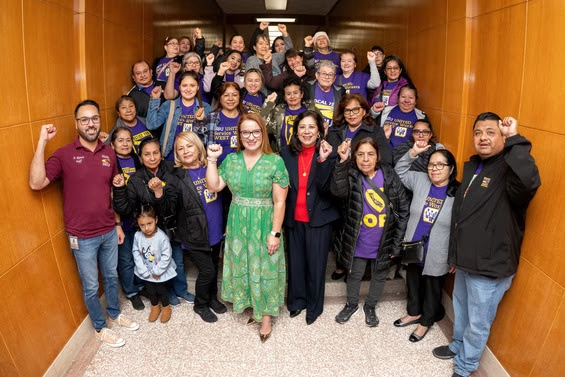
LA General Medical Center Program Reduces Hospital Stay for Uninsured Hemodialysis Patients
LOS ANGELES — Los Angeles General Medical Center has launched a groundbreaking hemodialysis program that has reduced the average hospital stay for uninsured patients by more than five days, marking a first-of-its-kind initiative authorized by the California Department of Public Health or CDPH.
Launched in February 2020, the program allows uninsured patients beginning hemodialysis or HD to temporarily receive outpatient-level dialysis in the hospital’s inpatient HD unit while their insurance applications are processed. Previously, uninsured patients faced prolonged hospitalizations because outpatient HD centers could not accept them until coverage was secured.
“Nearly one in five patients admitted to LA General arrive without insurance,” said Jorge Orozco, CEO of LA General. “CDPH’s authorization allowed us to safely provide transitional dialysis, reducing hospital stays and helping patients return home faster, with dignity and support.”
Study Findings
- The average length of stay at LA General dropped from 13.0 days to 7.6 days—a reduction of 5.4 days (p < 0.001).
- Control hospitals within the Los Angeles County Department of Health Services network saw smaller reductions of less than three days using emergency department–based transitional dialysis.
- No increase in 30-day readmissions or mortality was observed, confirming the program’s safety.
Los Angeles County to Strengthen Labor Protections for Janitorial and Security Workers
LOS ANGELES — The Los Angeles County Board of Supervisors Nov. 20 approved a motion directing the development of a formal labor peace agreement and worker retention policy for janitorial and security staff at county-operated facilities.
Labor peace agreements help ensure continuity of services, reduce the risk of labor disputes, and foster cooperative labor-management relationships. As the county expands its use of Proposition A contracts, which allow outsourcing of janitorial, food, and security services when more cost-effective than county staff, it is essential to consistently apply labor peace protections to safeguard service quality and workers’ rights.
“I applaud the Los Angeles Board of Supervisors for taking a big step toward protecting the workers who keep our public spaces running. County contracted Janitors and Security Officers have been sounding the alarm for years about dangerous workloads, poverty wages, and employers who cut corners at the expense of worker safety and community well-being. This proposal is a clear message that our leaders are listening. Our union is proud to support this effort, and we’re ready to continue fighting for a county where every worker is treated with dignity, respect, and fairness,” David Huerta, President of the Service Employees International Union-United Service Workers West (SEIU-USWW).
The motion directs the chief executive officer, in consultation with county departments, to develop a labor peace agreement and worker retention policy for all Proposition A contracts involving janitorial and security services at county-owned or managed facilities. Contractors will be required to provide evidence of a labor peace agreement before starting new work or extending existing contracts.
The CEO will report back within 90 days with a draft policy that includes definitions, applicability criteria, enforcement mechanisms, and an implementation plan showing how the policy will integrate into county procurement processes. The report will also analyze potential fiscal and operational impacts and reflect input from labor organizations, including SEIU-USWW.
The motion aims to maintain uninterrupted public services while ensuring that janitorial and security workers, many of whom are women, immigrants, and people of color, receive fair treatment, job security, and a voice in their workplaces.


